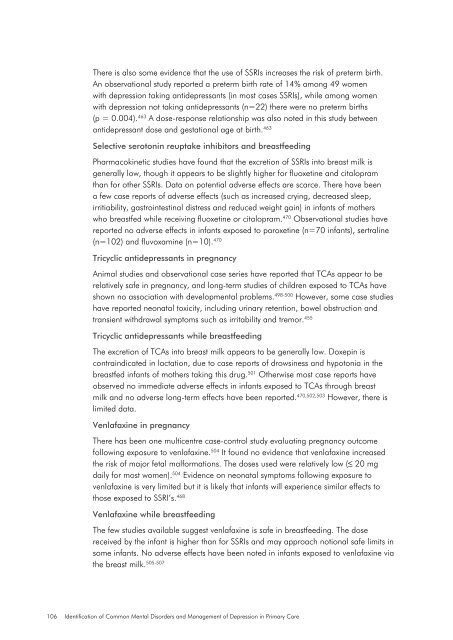Common Mental Disorders Depression - New Zealand Doctor
Common Mental Disorders Depression - New Zealand Doctor
Common Mental Disorders Depression - New Zealand Doctor
You also want an ePaper? Increase the reach of your titles
YUMPU automatically turns print PDFs into web optimized ePapers that Google loves.
There is also some evidence that the use of SSRIs increases the risk of preterm birth.<br />
An observational study reported a preterm birth rate of 14% among 49 women<br />
with depression taking antidepressants (in most cases SSRIs), while among women<br />
with depression not taking antidepressants (n=22) there were no preterm births<br />
(p = 0.004). 463 A dose-response relationship was also noted in this study between<br />
antidepressant dose and gestational age at birth. 463<br />
Selective serotonin reuptake inhibitors and breastfeeding<br />
Pharmacokinetic studies have found that the excretion of SSRIs into breast milk is<br />
generally low, though it appears to be slightly higher for fluoxetine and citalopram<br />
than for other SSRIs. Data on potential adverse effects are scarce. There have been<br />
a few case reports of adverse effects (such as increased crying, decreased sleep,<br />
irritiability, gastrointestinal distress and reduced weight gain) in infants of mothers<br />
who breastfed while receiving fluoxetine or citalopram. 470 Observational studies have<br />
reported no adverse effects in infants exposed to paroxetine (n=70 infants), sertraline<br />
(n=102) and fluvoxamine (n=10). 470<br />
Tricyclic antidepressants in pregnancy<br />
Animal studies and observational case series have reported that TCAs appear to be<br />
relatively safe in pregnancy, and long-term studies of children exposed to TCAs have<br />
shown no association with developmental problems. 498-500 However, some case studies<br />
have reported neonatal toxicity, including urinary retention, bowel obstruction and<br />
transient withdrawal symptoms such as irritability and tremor. 455<br />
Tricyclic antidepressants while breastfeeding<br />
The excretion of TCAs into breast milk appears to be generally low. Doxepin is<br />
contraindicated in lactation, due to case reports of drowsiness and hypotonia in the<br />
breastfed infants of mothers taking this drug. 501 Otherwise most case reports have<br />
observed no immediate adverse effects in infants exposed to TCAs through breast<br />
milk and no adverse long-term effects have been reported. 470,502,503 However, there is<br />
limited data.<br />
Venlafaxine in pregnancy<br />
There has been one multicentre case-control study evaluating pregnancy outcome<br />
following exposure to venlafaxine. 504 It found no evidence that venlafaxine increased<br />
the risk of major fetal malformations. The doses used were relatively low (≤ 20 mg<br />
daily for most women). 504 Evidence on neonatal symptoms following exposure to<br />
venlafaxine is very limited but it is likely that infants will experience similar effects to<br />
those exposed to SSRI’s. 468<br />
Venlafaxine while breastfeeding<br />
The few studies available suggest venlafaxine is safe in breastfeeding. The dose<br />
received by the infant is higher than for SSRIs and may approach notional safe limits in<br />
some infants. No adverse effects have been noted in infants exposed to venlafaxine via<br />
the breast milk. 505-507<br />
106<br />
Identification of <strong>Common</strong> <strong>Mental</strong> <strong>Disorders</strong> and Management of <strong>Depression</strong> in Primary Care

















